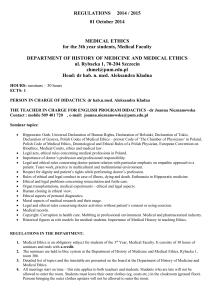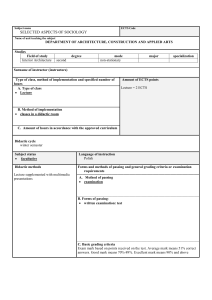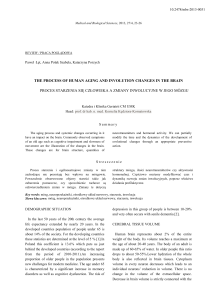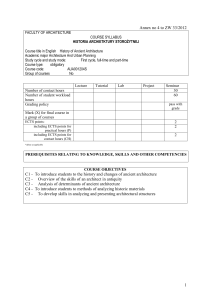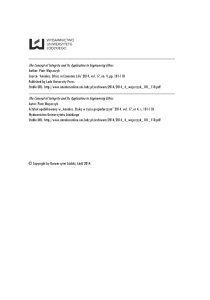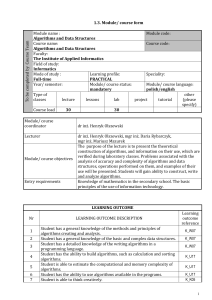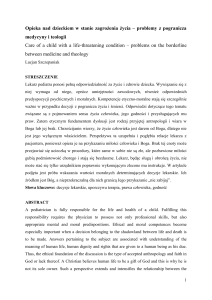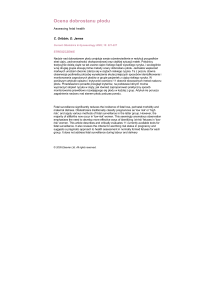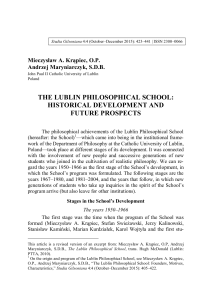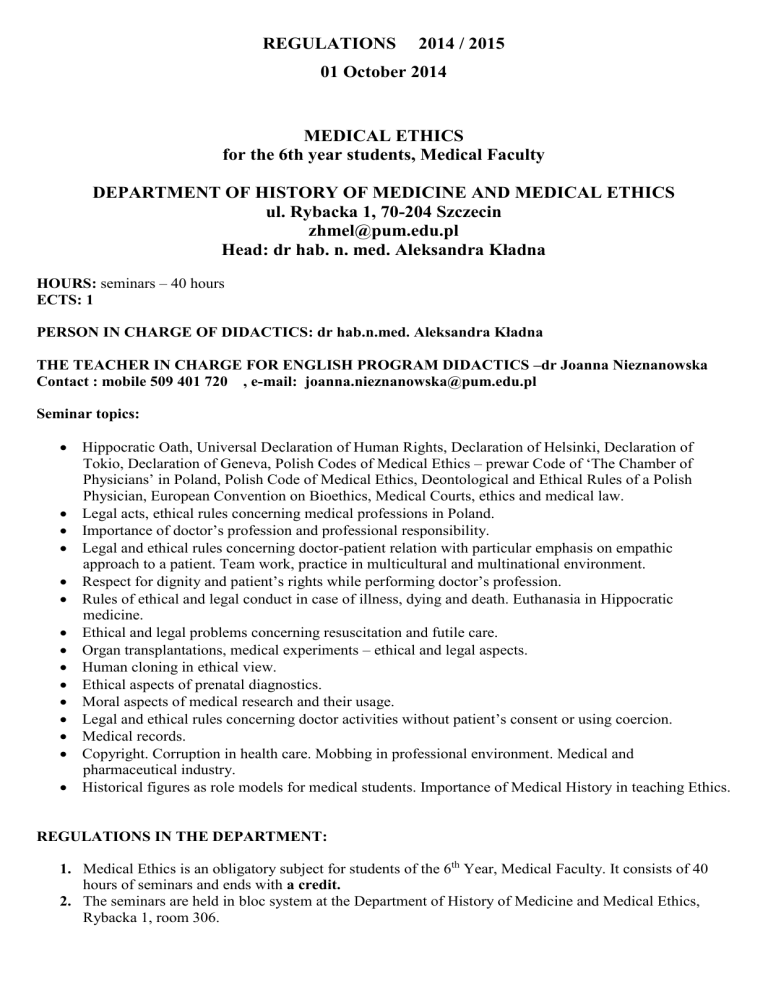
REGULATIONS
2014 / 2015
01 October 2014
MEDICAL ETHICS
for the 6th year students, Medical Faculty
DEPARTMENT OF HISTORY OF MEDICINE AND MEDICAL ETHICS
ul. Rybacka 1, 70-204 Szczecin
[email protected]
Head: dr hab. n. med. Aleksandra Kładna
HOURS: seminars – 40 hours
ECTS: 1
PERSON IN CHARGE OF DIDACTICS: dr hab.n.med. Aleksandra Kładna
THE TEACHER IN CHARGE FOR ENGLISH PROGRAM DIDACTICS –dr Joanna Nieznanowska
Contact : mobile 509 401 720 , e-mail: [email protected]
Seminar topics:
Hippocratic Oath, Universal Declaration of Human Rights, Declaration of Helsinki, Declaration of
Tokio, Declaration of Geneva, Polish Codes of Medical Ethics – prewar Code of ‘The Chamber of
Physicians’ in Poland, Polish Code of Medical Ethics, Deontological and Ethical Rules of a Polish
Physician, European Convention on Bioethics, Medical Courts, ethics and medical law.
Legal acts, ethical rules concerning medical professions in Poland.
Importance of doctor’s profession and professional responsibility.
Legal and ethical rules concerning doctor-patient relation with particular emphasis on empathic
approach to a patient. Team work, practice in multicultural and multinational environment.
Respect for dignity and patient’s rights while performing doctor’s profession.
Rules of ethical and legal conduct in case of illness, dying and death. Euthanasia in Hippocratic
medicine.
Ethical and legal problems concerning resuscitation and futile care.
Organ transplantations, medical experiments – ethical and legal aspects.
Human cloning in ethical view.
Ethical aspects of prenatal diagnostics.
Moral aspects of medical research and their usage.
Legal and ethical rules concerning doctor activities without patient’s consent or using coercion.
Medical records.
Copyright. Corruption in health care. Mobbing in professional environment. Medical and
pharmaceutical industry.
Historical figures as role models for medical students. Importance of Medical History in teaching Ethics.
REGULATIONS IN THE DEPARTMENT:
1. Medical Ethics is an obligatory subject for students of the 6th Year, Medical Faculty. It consists of 40
hours of seminars and ends with a credit.
2. The seminars are held in bloc system at the Department of History of Medicine and Medical Ethics,
Rybacka 1, room 306.
3. Detailed list of topics and the timetable are presented on the board at the Department of History of
Medicine and Medical Ethics.
4. All meetings start on time – this rule applies to both teachers and students. Students who are late will
not be allowed to enter the room. Students must leave their outer clothes (eg. coats etc.) in the
cloakroom (ground floor). Persons bringing the outer clothes upstairs will not be allowed to enter the
room.
5. Students are obliged to prepare for each seminar. Students, who prove unprepared for a seminar and
obtain failing grade, are obliged to correct the failing grade within two weeks.
6. In case of one excused absence a student can get a credit, but is obliged to make up for the seminar
missed by reporting on the topic missed to the teacher in charge, within two weeks.
7. Three not-excused and not made up absences will result in not getting a credit.
8. The Head of the Dept. may give up point 7. in well documented adverse cases.
9. Credit will be granted to students who attend all the seminars and pass the final written test during
the last seminar.
10. The entry in the credit book should be as follows:
Subject
Medical Ethics
Head
dr hab. med. Aleksandra
Kładna
Lectures
Laboratory
40 hours (bloc)
11. According to the Instruction No 71/2012 and 72/2012, please note that it is forbidden to have
mobile phones or any other electronic equipment that allow communication during examinations
and credits.
Obligatory literature:
1.
2.
3.
4.
Abramsky L.,Chapple J.: Diagnostyka prenatalna, Warszawa,1996
Bernard J.: Od biologii do etyki.Wydawnictwo Naukowe PWN sp.z o.o., Warszawa,1994
Biegański W.: Myśli i aforyzmy o etyce lekarskiej. Warszawa 1957
Dokumenty etyczne World Medical Association(Deklaracja helsińska, tokijska i inne) dostępne na
stonie www.wma.net)
5. Europejska konwencja o ochronie praw człowieka i godności ludzkiej wobec zastosowań biologii i
medycyny(Rada Europy,Oviedo,kwiecień 1997)
6. Hołówka J.: Etyka w działaniu.Pruszyński i S-ka. Warszawa,2001
7. Heimann T.: Etyka lekarska i obowiązki lekarza. Deontologia. Warszawa 1917
8. Kielanowski T. (red.) Etyka i deontologia lekarska.PZWL. Warszawa 1985
9. Kodeks Etyki Lekarskiej z dnia 02 lutego 2004 roku
10. Komitet Etyki w Nauce PAN.: Dobre obyczaje w nauce (dokument na stronie www.ken.pan.pl).
11. Łuków P.: Granice zgody: autonomia zasad i dobro pacjenta.Scholar.Warszawa,2005
12. Muszala A.: Wybrane zagadnienia etyczne z genetyki medycznej. Kraków,1998
13. Mac Intre A.: Krótka historia etyki. Wydawnictwo Naukowe PAN. Warszawa,2012
14. Nowacka M.: Etyka a transplantacje. PWN. Warszawa 2003
15. Olejnik S.: Etyka lekarska,Katowice,1995
16. Powszechna Deklaracja Praw Człowieka
17. Singer P.: Etyka praktyczna.Przekł. z ang. A.Sagan. Warszawa,2003
18. Suchorzewska J.(red.), wybrane zagadnienia etyki lekarskiej z elementami prawa w medycynie.
Akademia Medyczna w Gdańsku, Gdańsk 2006
19. Szumowski W.:Historia medycyny. PZWL,Warszawa 1961
20. Tulczyński A.: Wzory osobowe polskiej deontologii lekarskiej. Polskie Towarzystwo Higieniczne.
Warszawa ,41,1993
21. Zasady dobrej praktyki badań klinicznych wydane przez Międzynarodową Konferencję ds.
Harmonizacji w 1996 r.
22. Ziółkowska- Rudowicz, E., Kładna, A., Empathy as an import ant clinical sill. W: A.Kładna (Red.).
Nursing. Desmurgy. Published by The Pomeranian Medical University of Szczecin, 2008, s. 9-20.

